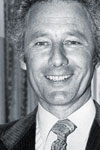 |
| |
MI6 profiles Derek Meddings, the miniature and special
effects master from "Live And Let Die" to "GoldenEye"...
|
|
Derek Meddings Biography
27th June 2009
Born on January 15th 1931,
Derek Meddings grew up with filmmaking in his blood; both
his parents worked at the famed Denham studios. At the
time, this was the largest soundstage facility in the UK
and here his father worked as a carpenter and his mother
as a producer's assistant and often an extra or stand-in.
In the mid-1940s, Meddings enrolled in
art school and in his spare time came to work at the studio
assisting in the creation typography for film credits.
At Denham, he met the Canadian special effects expert
Les Bowie, and fell in love with film effects.
Bowie took a shine to Meddings and offered him a job in the matte painting department of his effects crew. Meddings contributed to a series of Hammer Horror flicks, painting the Transylvanian hillsides for the iconic backdrop of Hammer's Dracula productions.
Amongst the crew, Meddings learned quickly
that to be a great special effects man he would have to
learn
how to perform some amazing tricks on a shoe-string budget.
It was this methodology, and talent, that caught the eye
of Gerry Anderson. |
|
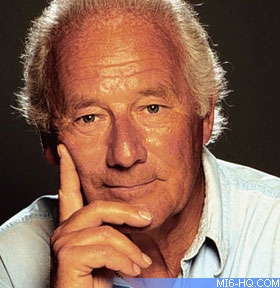
Datastream
Name:
Derek Meddings
Date of Birth: 15th January 1931
Date of Death: 10th September 1995
Active Career: 1961-1995
Bond films: 6 |
|
In the early 1960s, Gerry Anderson was perfecting
a technique he called "Supermarionation" - which utilised
complex marionette-like puppets that could be lip-synced to
dialogue and incorporated moving eyes, eye-lids, etc. Anderson
and Meddings first teamed up on 1961's "Supercar" but
their success came in the form of follow-up shows, "Stingray" and "Thunderbirds".
With "Thunderbirds", Meddings had
perfected his technique and some of his most impressive work
includes the launching of five ultra-futuristic life-saving machines,
all built in miniature. The Thunderbird models had working
parts that blew smoke or operated hydraulics and Meddings also
contributed to the highly detailed scenes and backdrops that
made the world of Supermarionation tick.
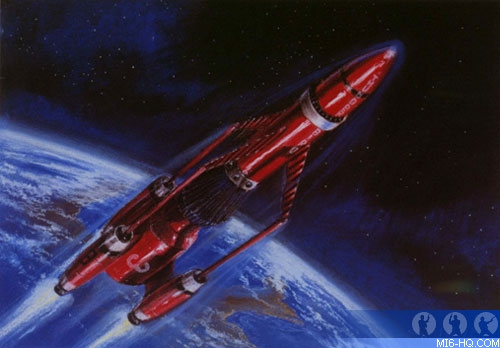
Above: Concept art for Thunderbird 3
by Derek Meddings.. |
Some of the most difficult problems were solved
in the simplest ways. The Thunderbirds had to be seen to be traveling
vast distances (even into space). His solution was to leave
the models static and spin the background - a repeating texture
of clouds or stars - on a continuous loop. His work on the Anderson
productions brought Meddings industry acclaim. Meddings began
to live by the industry in-joke that all he needed was some "string
and cardboard" to make magic happen on screen.
He worked with puppets for a final time on 1968's "Joe 90" before moving onto live-action productions such as the space-age "Doppelgänger" which was written and produced by Gerry and Sylvia Anderson.
Meddings work saw him welcomed onto the
1973 James Bond production "Live
And Let Die", where he was credited as part of
the special effects department. On Roger
Moore's first credit as the British super spy, Meddings
and a team rigged up the explosive Kananga double
and helped to detonate the villain's poppy fields in
miniature.
|
|
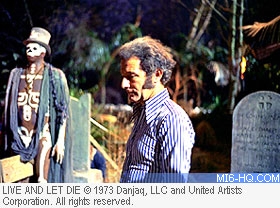
Above: Derek Meddings on set of"Live And Let Die" in
1973... |
Roger Moore later recalled the immense respect
he had for Meddings and the enjoyment he got from seeing the
technical wiz's tricks on screen. The film's producers also noted
and respected his work on "Live And Let Die". Before
the shoot was concluded, Cubby
Broccoli approached Meddings to discuss how he could be more
involved in the creative process and how the Bond films could
adopt the use of miniatures in their productions.
"The Spy Who Loved Me" (1977) saw a starring role for the Lotus Esprit. One of only two that had been put into production was loaned to the crew for the serious driving, but Meddings and his team got their hands on a shell of another and rigged this one to be an underwater craft. Everything that fans see on screen really did work - the only minor niggle was that the shell was not watertight and so had to be piloted by divers equipped with aqualung.
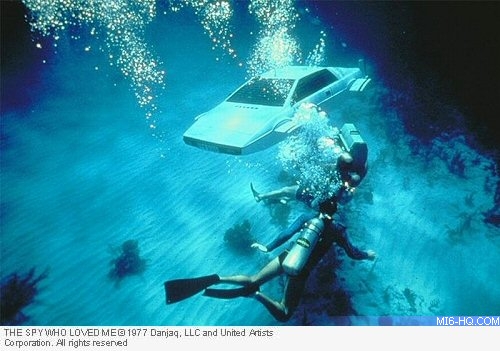
Above: The sub-aquatic Lotus Esprit... |
Meddings true skill was the miniatures: the aquatic Atlantis based owned by Stromberg was a miniature that could submerge and rise from the water. Ken Adam's designs were converted to reality by Meddings, and after complexities with the borrowing of a super-tanker, Meddings built one from scratch. Every shot of the Liparus was a miniature built by Derek Meddings' department.
Beyond Bond, Meddings worked on pre-historic
adventure film "The Land That Time Forgot" in 1975
with minimal budget, and "Aces High". The latter was
a 1976 production with a much more suitable budget, allowing
Meddings to work with real live airplanes from World War I.
The special effects man was responsible for kitting out the aircraft
with dummy explosives for the action scenes. Gun shots were simulated
with strobe lights and gas canisters were strategically placed
to simulate an engine fire. In 1978, Meddings worked with his
old hero Les Bowie on the production of classic: "Superman".
Meddings was part of the team that made the Man of Steel
fly and his model team built a gigantic 'miniature' of
the Golden Gate Bridge on the studio black-lot in order to simulate
its destruction.
Undoubtedly, Meddings' all time high came with
the outer-space production: "Moonraker".
On this film, Meddings headed up the special effects department
to create hundreds of shots for all of the space sequences. Meddings
built the incredible space station, several space shuttles and
perfected techniques stemming from his"Thunderbirds" days
to create an Oscar nominated sequence. One of the techniques
used by the special effects team was known as "in the camera" effects.
Meddings would can a shot (often in stop-motion) and then roll
back the film in the camera in order to "layer" elements
together. First the stars would be shot as a plate, then the
earth was added and then finally the tiny space shuttle was layered
on top.
Meddings returned on "For
Your Eyes Only" as the special effects supervisor,
but this Bond film was more down-to-earth and Bond required
fewer gadgets and miniatures. The two sequences handed over
to the miniature department was the Neptune's
exploration of the deep and the pretitle sequence where Bond's
helicopter is hijacked. After the 1981 film wrapped, Meddings
departed the Bond family for close to fourteen years. During
this period he worked on a slew of popular films including, "Superman
II" and "Superman III" as well as, "Santa
Claus", "Krull" and "Batman". For
the Dark Knight's first flick, Tim Burton, who revealed he
was a fan of Bond and of the Thunderbirds, personally approached
Meddings to get him on his crew.
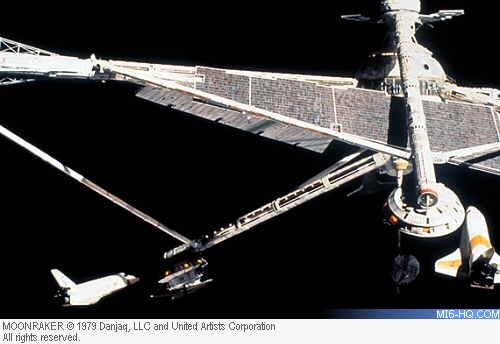
Above: For the climax of the movie, Meddings
and his team destroyed the space station
by using shot guns
filmed
in slow
motion. |
In 1994, Meddings returned to the Bond family, where he and two of his six children were working on miniature scenes that included the fighter jet's crash into the Severnaya GoldenEye ground control.
Sadly, September 10th 1995, Meddings passed away in London: shortly after his commitments to the "GoldenEye" production had concluded.
Related Articles
 Biography
Biography
 Moonraker
Moonraker
 GoldenEye
GoldenEye